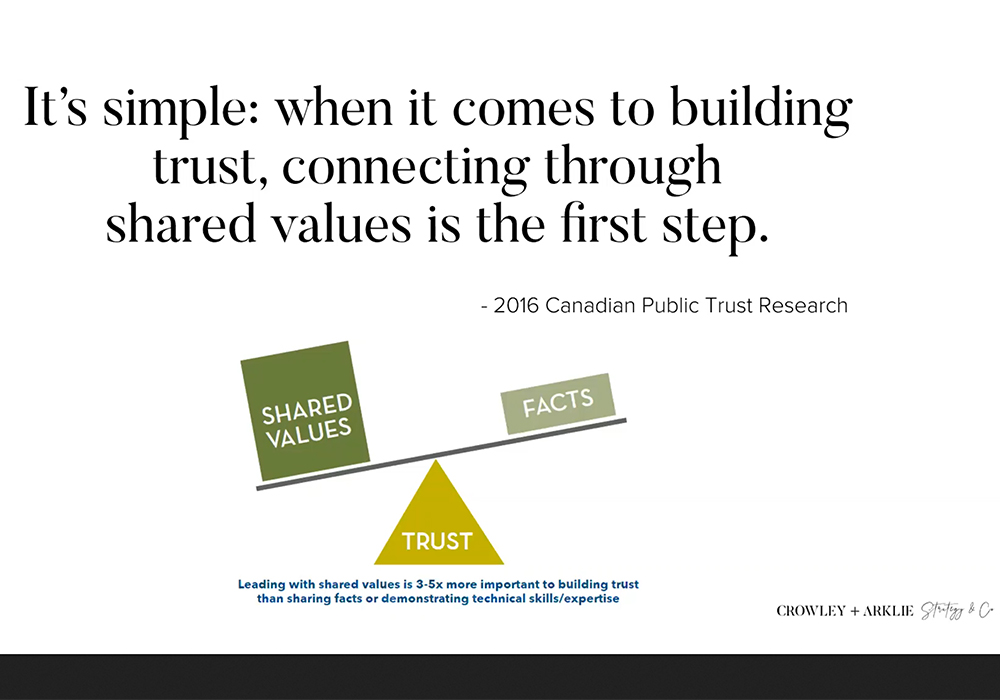Christina Crowley-Arklie is on a mission to change the way agriculture and food is communicated.
It’s time, said the Guelph-based communicator and marketer, for value-based storytelling conversations to be conveyed more effectively in the industry.
“The idea around agriculture embracing values at a time where public trust is not just a buzzword anymore, it’s a reality for many of our organizations. We have to do a better job of storytelling to build that public trust. And that is why we need to connect with values to have those stories and to have those conversations,” she said.
Read Also

Using artificial intelligence in agriculture starts with the right data
Good data is critical as the agriculture sector increasingly adopts new AI technology to drive efficiency, sustainability and trust across all levels of the value chain.
Connecting with values was her topic of discussion during a webinar hosted by the Canadian Centre for Food Integrity on April 22.
“Values are what are driving consumer decisions. Full stop. And in order to build trust with those consumers, you must find shared common values,” she said.
There are two kinds of values. Terminal values help define someone’s end goals, while instrumental values are how a person lives each day to achieve their terminal values.
“Values lay the foundation for who we are. They influence our behaviour. And then of course, most importantly, they make us choose the brands that we interact with. They make us choose what products we buy, they make us choose what organizations we want to go work for,” she said.
She said on a scale for gaining public trust, shared values have more weight than facts.
“Leading with shared values was three to five times more important in building trust than sharing facts and figures.”
“Our agri-food industry (is) really good at sharing facts and figures but do we actually ask ourselves, do we find the things in common with consumers first to build that trust before we actually share the facts and figures with them?” she said.
“Marketing doesn’t have to be right. It has to feel right. And I know that can be very hard for our agri-food passionate advocates because we are so driven in our facts and figures…. The feeling has to be right and that’s what consumers are craving.”
The University of Waterloo recently completed a values report that speaks to the nine things that Canadians generally share and uphold: diversity, inclusion, democracy, safety, economic security, fairness, equity, health and sustainability.
However, Crowley-Arklie said no additional research has been done to see how the above study relates to agriculture and food.
“When are we going to have that exercise that says, what are the values of Canadian agriculture and food? And why I say that is because right now, consumers don’t have one message from Canadian agriculture and food,” she said.
“Would they be able to really recognize that these are the values that our industry upholds every day and lives by and that’s why we’re growing and making food for them? I don’t think we have that.”
During the pandemic she said several leading Canadian brands have come out with campaigns that speak wholeheartedly to not just Canadian values but values as human beings.
“The brands are taking a chance that yes, talking about things during COVID-19, we’re feeling very uncomfortable, but they’re doing it in a way that relates to the values that we want to hear from them. We want to know that we’re in this together. We want to know that we’re going to get through this. We want that kind of type of humanization and positivity right now,” she said.
The pandemic is also an opportunity to see how certain shared values are being communicated that might not otherwise be effective.
“COVID-19, I think, is a perfect example of how you’re seeing brands and businesses connect with values and why you’re seeing that’s impacting us at a greater level. And why Canadian agriculture certainly can benefit from connecting with values,” she said.
“I think when things are disrupted, especially in the times we’re living through, it brings about change and while it can be very uncomfortable at first, I think it’s what makes us adapt and be better and that’s certainly an industry like agriculture and food. We’re constantly changing. We are the leading innovators. We are disruptive and embracing it. But if you said that to a consumer, I bet they would be a little bit hesitant thinking that we’re innovators.”
















